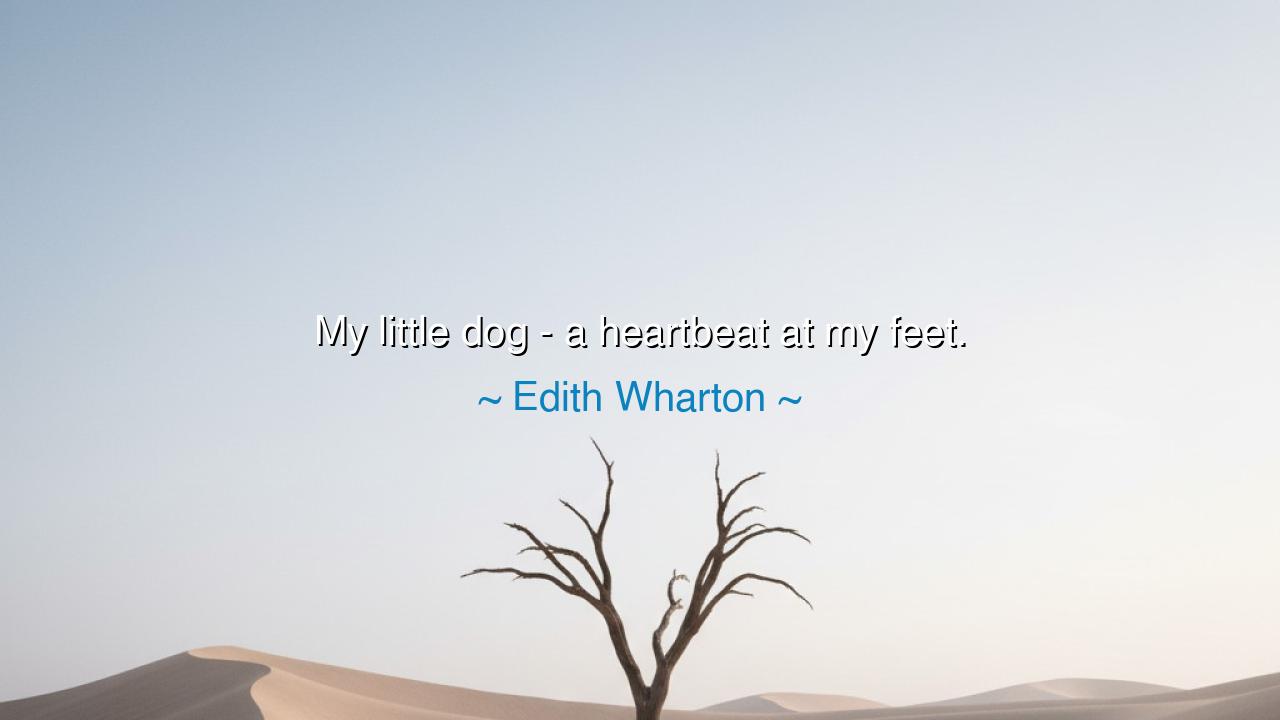
My little dog - a heartbeat at my feet.






h Wharton, the great chronicler of human hearts, once spoke with tenderness: “My little dog—a heartbeat at my feet.” In these few words, she revealed a truth that transcends time and culture. For the dog, humble and devoted, is more than fur and bone; it is living companionship, a pulse of loyalty that anchors the restless soul. To call it a heartbeat is to recognize that it is not merely present, but alive in rhythm with its master, as constant and faithful as the very blood that sustains life.
The origin of this saying springs from Wharton’s own life, a woman surrounded by grandeur yet seeking simplicity. Amid the salons and estates of high society, she found solace in her dogs—creatures who loved without judgment, who offered comfort without demand. In them she saw not vanity nor ambition, but truth, distilled to its purest form. They lay at her feet, silent yet eloquent, reminding her that in a world of shifting alliances and fragile affections, here was one bond that never wavered.
Think of what it means to have a heartbeat at your feet. It is to be reminded, each moment, that you are not alone. The small presence, breathing softly by the fire, is a guardian of the spirit, steady as the ticking of a clock yet warmer, more personal, more divine. Many kings have ruled nations but have lacked such a presence; many generals have commanded armies yet have yearned for a single loyal companion at their side. Thus Wharton teaches: greatness is not measured by the power one commands, but by the quiet company one keeps.
History offers us radiant examples. When Frederick the Great of Prussia lay dying, it was not his ministers nor soldiers he asked for, but his beloved greyhounds. In their soft gazes, he found the comfort that crowns could not provide. And in the trenches of the Great War, countless soldiers kept dogs not only for duty, but for solace. Amid the roar of guns and the stench of mud, the sight of a dog’s wagging tail was a reminder of life’s goodness, a heartbeat of hope in a landscape of despair. These moments confirm Wharton’s truth: in the smallest creatures lies the greatest comfort.
Yet this saying reaches beyond dogs. It calls us to recognize the value of companionship itself, especially the quiet, loyal companionship that stands beside us without demand. Too often we measure worth by grand gestures, by words shouted across halls and arenas. But Wharton whispers to us: look instead to the presence that waits silently, faithfully, at your side. A heartbeat is not loud, yet it sustains life; a friend’s presence may be quiet, yet it sustains the soul.
The lesson, therefore, is one of gratitude. Cherish the ones who sit at your feet—not above you in judgment, not distant in pride, but near you in love. Whether it is the dog who guards your silence, the friend who listens without interruption, or the family member who shares your hearth, these are the heartbeats that keep loneliness from devouring the soul. They may seem small, but their power is immeasurable.
Practically, we must learn to honor such presence. When you see the quiet devotion of one who stands by you, pause and give thanks. Do not overlook them while chasing distant applause. Bend down, as Wharton did, to notice the heartbeat at your feet. Spend time with your companions, whether human or beast. Offer them affection, patience, and loyalty equal to their own. For in doing so, you weave bonds stronger than kingdoms and richer than gold.
So remember Wharton’s words: “My little dog—a heartbeat at my feet.” They remind us that life’s deepest treasures are not found in crowns or conquests, but in loyalty, presence, and love. Seek these treasures, cherish them, and you will never walk alone, for your steps will always be guided by the steady rhythm of a heartbeat beside you.






AAdministratorAdministrator
Welcome, honored guests. Please leave a comment, we will respond soon